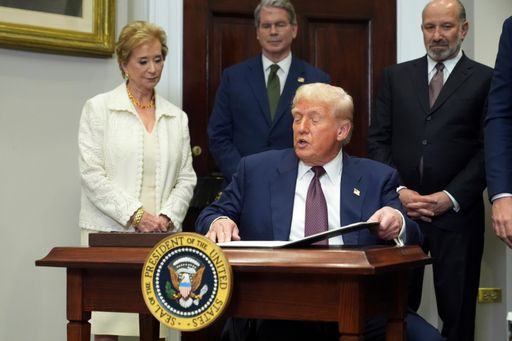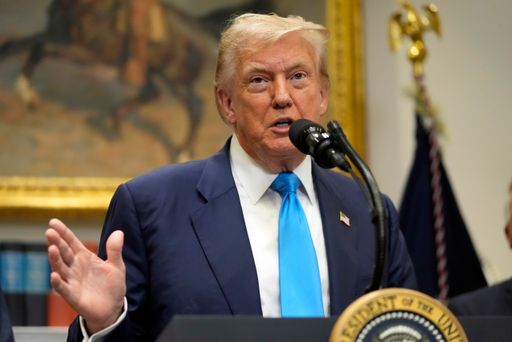US trade partners around the world were reacting on Friday to President Donald Trump's executive order that would introduce new tariffs on many of them in seven days.
As the global economy and alliances face a fresh test from the president's trade agenda.
Trump's order was issued on Thursday night and came after a flurry of tariff-related activity in recent days, as the White House announced agreements with various nations and blocs ahead of Trump’s self-imposed August 1 deadline.
However, Trump also pushed the start date of the tariff back by seven days to August 7 so that the tariff schedule could be updated. He also said on Thursday he would be extending trade negotiations with Mexico for 90 days.
But the vast majority of nations are continuing to face uncertainty ahead of the coming deadline.
And while a handful of trade deals have trickled in, many details remain hazy, with businesses and manufacturers around the world bracing for heightened operating costs and potential price hikes regardless.
Meanwhile, Trump’s overhaul of American trade policy hasn't gone unchallenged.
Appellate court judges have expressed broad scepticism around Trump’s legal rationale for his most expansive round of tariffs.
The new rates are due to take effect on August 7, but uncertainty over what Trump might do next remains.
The way ahead for China, which runs the largest trade surplus with the US, is unclear after talks earlier this week in Stockholm produced no deal. Trump has yet to say if he'll extend an August 12 pause on painfully high import duties on Chinese products.
The reaction from financial markets was muted.

Canada was hit with a tariff hike from 25 percent to 35 percent, drawing criticism from PM Mark Carney, who called the move unjustified.
Trump cited what he said was a lack of cooperation in stemming trafficking in illicit drugs across the northern border. He also expressed frustration with a trade deficit largely due to US oil purchases.
While many Canadian exports are covered under the United States-Mexico-Canada Agreement (USMCA), sectors like steel, aluminium, and automobiles remain vulnerable.
Deep regret
In Switzerland, officials expressed deep regret over Trump’s decision to raise tariffs to 39 percent, up from the initially proposed 31 percent. The Swiss government emphasised its constructive approach in bilateral talks and reiterated its commitment to a negotiated resolution.
New Zealand saw tariffs rise to 15 percent from 10 percent, prompting concern from Trade Minister Todd McClay, who said further increases would significantly impact the country’s exporters. New Zealand, which ran a $1.1 billion trade surplus with the US in 2024, continues to seek a better deal, especially as no agreement has yet been reached.
Australian Trade Minister Don Farrell said the 10 percent overall tariff on Australia’s exports to the United States was a vindication of his government’s “cool and calm negotiations.” But he said even that level was not justified. The US exports twice as much to Australia as it imports from its bilateral free trade partner, and Australia imposes no tariffs on US exports.
Japanese Chief Cabinet Secretary Yoshimasa Hayashi was cautious in welcoming Trump's executive order setting Japan’s tariff at 15 percent after the two sides worked out an agreement, much to Tokyo's relief.
Taiwan received a reduced tariff of 20 percent, down from a proposed 32 percent, though President Lai Ching-te noted that further negotiations are needed. Taiwan remains a key supplier of advanced semiconductors and emphasised its commitment to deeper cooperation with the US in defence, technology, and trade.

Avoiding steeper penalties
In Cambodia, officials welcomed a 19 percent tariff, a significant improvement from the initial 49 percent rate proposed in April. Cambodia agreed to impose zero tariffs on US goods and to purchase Boeing aircraft, signalling alignment with US trade priorities. A recent ceasefire between Cambodia and Thailand also played a role in avoiding steeper penalties.
"The outcome of this negotiation signals that Thailand must accelerate its adaptation and move forward in building a stable and resilient economy, ready to face global challenges ahead," Trump said.
For Bangladesh, a new 20 percent tariff warded off an earlier threat of a 35 percent import duty for the South Asian exporter of garments and other light-manufactured goods. “That’s good news for our apparel sector and the millions who depend on it,” said Khalilur Rahman, the country's national security adviser and lead negotiator.
"We’ve also preserved our global competitiveness and opened up new opportunities to access the world’s largest consumer market” Rahman said. “Protecting our apparel industry was a top priority, but we also focused our purchase commitments on US agricultural products. This supports our food security goals and fosters goodwill with US farming states.”
Market reactions have been modest overall, although South Korea’s Kospi index fell nearly four percent after the US imposed a 15 percent tariff on South Korean goods. Despite limited market panic, uncertainty persists, particularly as Trump’s tariff agenda faces legal scepticism in US appellate courts.















